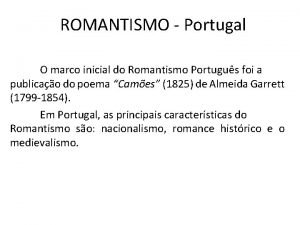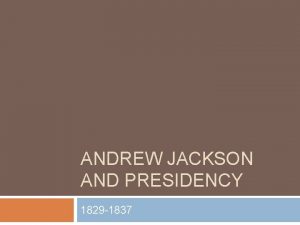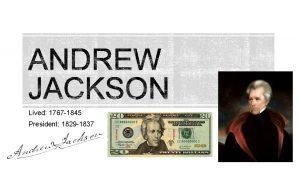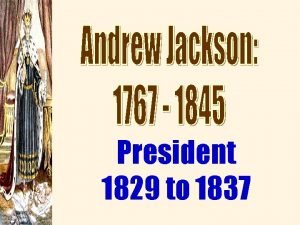The Jacksonian Presidency 1829 1837 The Jacksonian Impact






- Slides: 6

The Jacksonian Presidency, 1829 – 1837 The Jacksonian Impact: Jackson drastically increased the power of the executive branch through vetoes and by threatening to use the military against S. Carolina. The Taney Court: returned power to the States Mayor of New York v. Miln: New York can use its police power to inspect the health of newly arrived immigrants Briscoe v. Bank of Kentucky: a bank owned by Kentucky can issue currency – despite Article I Section 10 of the Constitution prohibiting such action. Charles River Bridge v. Warren Bridge (1837): Contracts could be breached if it benefited the community In essence, it reversed Dartmouth College v. Woodward

States reaction to Jackson NEW STATE CONSTITUTIONS called for less government 1. Increased voting rights for all white men 2. More elected officials – less appointed 3. Limited Government’s role in the economy (laissez faire – or classical liberalism) 4. Forbid special charters for corporations 5. Set strict limits on State debt

The Whig Worldview: The WHIGS Formed in response to “King Andrew I” Favored strong central government – like the Federalists Wanted leadership by men of ability, not men who were born rich Promoted govt. subsidies for internal improvements (especially in the West) q Northern Whigs q q q Southern Whigs q q q Wanted protective tariffs to protect industry Believed in social mobility and equal opportunity for every American Opposed the power and policies of rich plantation owners – who were Democrats Turned against Jackson because of the Nullification Crisis However they disagreed with the higher tariffs that Northern Whigs supported and because of slavery, they also disagreed with the notion of equal opportunity Anti-Masons Become Whigs: 1 st 3 rd Party Anti-secret society

ELECTION OF 1836 Martin Van Buren vs. several Whigs The Whigs hoped to send the election to the House of Representatives – similar to 1824. Van Buren is a disciple of Jackson, who has no use for the American System of Henry Clay Van Buren wins the election but is plagued by the Panic of 1837: The Panic is caused by: Over-speculation in canal building, crop failures, economic downturn in Europe and the Specie Circular Effects: 100 s of banks failed, unemployment grew, prices of land dropped

“Tippecanoe and Tyler Too” Election of 1840 Van Buren v. William Henry Harrison “Tippecanoe and Tyler Too” (John Tyler was Harrison’s vice presidential partner) “Log Cabins and Hard Cider” Economic downturn killed Van Buren’s chance for re- election However Harrison died of pneumonia 30 days into his presidency after giving a six hour inaugural address making Tyler the President Tyler was a Democrat at heart, but he hated Jackson Once in office, Tyler rejected many Whig programs, became a president without a party

Election of 1840











